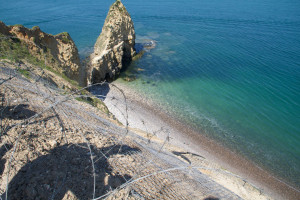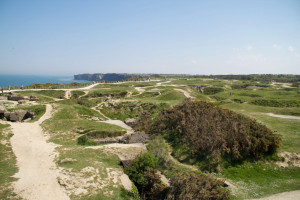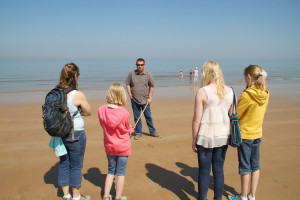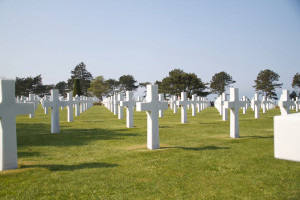
Point Du Hoc, Normandy France

Point Du Hoc (at the top of the cliff) Normandy, France


American Cemetery at Colleville
Here we are 70 years later. It has been a mere 70 years since allied troops landed on the beaches of Normandy to keep the free world free. “On June 6, 1944, more than 160,000 Allied troops landed along a 50-mile stretch of heavily fortified French coastline, to fight Nazi Germany on the beaches of Normandy, France. Gen. Dwight D. Eisenhower called the operation a crusade in which, ‘we will accept nothing less than full victory.’ More than 5,000 Ships and 13,000 aircraft supported the D-Day invasion, and by day’s end, the Allies gained a foot-hold in Continental Europe. The cost in lives on D-Day was high. More than 9,000 Allied Soldiers were killed or wounded, but their sacrifice allowed more than 100,000 Soldiers to begin the slow, hard slog across Europe, to defeat Adolph Hitler’s crack troops.” (Army.Mil) Five French beaches were taken by the allies: Juno, Gold, Sword, Omaha, and Utah. So why DO I care? Why should any of us care? Most often, there is an assumption that I care because my husband spent 23 years in the United States Air Force. Or others think, “Oh sure you care and know a lot about D-Day because you are veteran of Desert Storm. You care because you have been connected to the military most of your adult years.” But that is simply not true. Yes, I care about D-Day for all of those reasons, but if those reasons did not exist, would I still be teaching my children the facts about D-Day, Pearl Harbor, Battle of the Bulge, Gettysburg, Valley Forge? Even if it were true that our income were not dependent upon the military for the last 23 years, and even if it were true that their dad had a 9-5 job that found him home most evenings and weekends, would I still be teaching them the importance of D-Day? Would I recognize the impact it has made on their lives, as they unwittingly enjoy all the privileges that are afforded them-which has been at the expense of literally thousands upon thousands of American lives? If for any reason, I would choose not to teach my kids the facts of D-Day, the importance of that day which truly will always live in infamy, then God help me. I recently started substitute teaching in the schools. Every day we stand and say the pledge of allegiance to the American flag in our schools. It always tugs at my heart a little when kids either do not stand, or do not place their hands over their hearts. Why should they? If they know absolutely nothing-not a single fact behind the reason for the flag and what it represents, why would they show respect to this very special symbol that represents their own history. And what they don’t know could hurt them. What we don’t know can contribute to a life that revolves around me! Not a life that revolves around serving others. If I know what happened on those beaches 70 years ago, and truly understand the losses that took place there, the profound stories of survival and death, it’s hard to remain smug and pious about my material wealth, my freedom, my time, money, and everything that I own! The more I know, the better off I am, and the better off are those around me, those I influence every single day of my life, both personally and professionally. This is something I know: On Omaha beach alone, there were over 2500 casualties on D-Day. The 116th regiment belonging to the 29th Infantry Division was believed to have lost over 75% of their entire regiment. That is a staggering statistic. In his book “D-Day,” Stephen Ambrose calls this chapter, “Visitors to Hell.” The 116th was in the first wave onto Omaha Beach, which later became known as “Bloody Omaha,” due to the horrific fighting and loss of lives on both sides that took place that day. I know the importance of that day simply because I read and study about it. And I read and study about it because I care about the sacrifices these men and women and their families have made literally so I can come and go as I choose. I care about those sacrifices in much the same way that I care about the sacrifices my husband makes for my family and I every day. It doesn’t take enlistment in a military career, a military paycheck or any other form of military service in order for us to care about this incredible event. It just takes common sense. It takes gratitude for everything you have. Here we are 70 years later. What have we learned? More importantly, what have I learned? Some might say, “The last thing I need is another history lesson.” But 70 years later, that is exactly what we need. D-Day was a pivotal battle(s). It was a turning point in WWII that eventually led to victory in Europe, and peace once again in places where people truly believed there may never be peace again. I hope that this year, on this 70th anniversary of D-Day, you will take a little time, just a few minutes to read about one hero from that day. There were thousands. Just pick one. Share the story of your hero with your kids and your family. And then just be thankful.